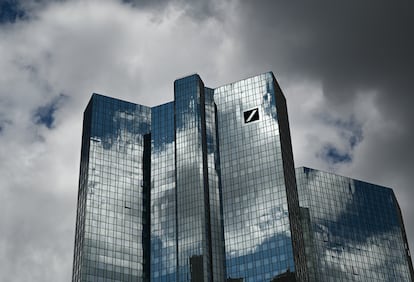Doubts about Deutsche Bank drag European banks into a Black Friday on the stock market
Shares of Germany’s largest bank fell more than 10%, bringing concerns about the health of the financial system back to the forefront

European banking has not recovered its calm. After closing the Credit Suisse crisis with its forced takeover by UBS, the spotlight is now on the eurozone and Deutsche Bank, another entity that has been showing signs of vulnerability for years. The insurance against default of Germany’s largest bank soared this Friday, and stock market losses immediately spread like wildfire throughout the sector without exception.
With the Credit Suisse rescue operation still very much in the news, and the U.S. regional banking crisis that has taken two banks by surprise still unresolved, investors’ sensitivities are at fever pitch. This was reflected on Friday in the performance of the Stoxx Europe 600 index, which groups together the main European banks, which was down 4% two hours before the close of the session.
Deutsche Bank (-10%), Commerzbank and Société Générale (-6%) and UBS (-5%) are among the most penalized. As for Spanish lenders, BBVA, Sabadell, Bankinter and Unicaja lost 4%, and CaixaBank and Santander 3%.
Monetary and government authorities have been insisting for days on the strength of the European financial system, but the message is not getting through. The fear that the turbulence has not disappeared and that there could be a new earthquake with its epicenter in Frankfurt is gaining ground.
Nobody has forgotten that Deutsche Bank - as was the case with Credit Suisse - has been marred by more than five years of scandals. The entity was fined $2.5 billion in 2015 for participating in the manipulation of the libor index (the London interbank market reference rate) together with other banks; in 2018, it was investigated by Brussels for being part of a cartel in the secondary market for sovereign bonds and in 2019 for a cartel in the foreign exchange market.
Despite these multiple fronts, the bank seemed to regain its pulse in 2022, when it earned more than €5 billion, its best result since before the financial crisis.
Confidence issues are returning to banking just as European leaders are holding a summit that was intended to send a message of reassurance to financial markets. But in an unusual decision for which no explanations have yet emerged, the president of the European Commission, Ursula von der Leyen, and the president of the European Council, Charles Michel, decided not to speak at a news conference at the end of the meeting.
German Chancellor Olaf Scholz, who was present at the meeting, did not dodge the issue: “Deutsche Bank has modernized. It is a profitable bank. There is no reason to be worried,” he said.
With additional reporting by Manuel V. Gómez.
Sign up for our weekly newsletter to get more English-language news coverage from EL PAÍS USA Edition
Tu suscripción se está usando en otro dispositivo
¿Quieres añadir otro usuario a tu suscripción?
Si continúas leyendo en este dispositivo, no se podrá leer en el otro.
FlechaTu suscripción se está usando en otro dispositivo y solo puedes acceder a EL PAÍS desde un dispositivo a la vez.
Si quieres compartir tu cuenta, cambia tu suscripción a la modalidad Premium, así podrás añadir otro usuario. Cada uno accederá con su propia cuenta de email, lo que os permitirá personalizar vuestra experiencia en EL PAÍS.
¿Tienes una suscripción de empresa? Accede aquí para contratar más cuentas.
En el caso de no saber quién está usando tu cuenta, te recomendamos cambiar tu contraseña aquí.
Si decides continuar compartiendo tu cuenta, este mensaje se mostrará en tu dispositivo y en el de la otra persona que está usando tu cuenta de forma indefinida, afectando a tu experiencia de lectura. Puedes consultar aquí los términos y condiciones de la suscripción digital.









































